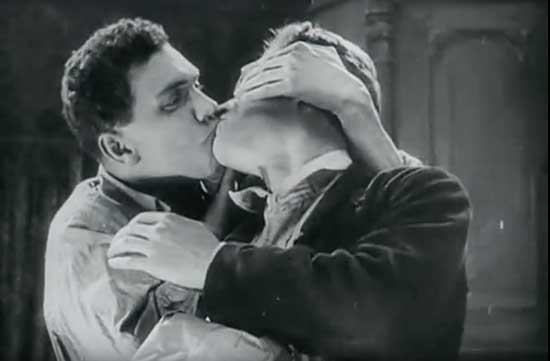
Slapstick International: Bed and Sofa (Tretya Meshchanskaya) (1927)
Thur 21st Jan | 11AM
Tickets: £6-£8. Click here to buy tickets.
Bristol Slapstick kicks off its “Slapstick International” section with one of the best and certainly the most immediately endearing of Soviet classics – Bed and Sofa. This is a film which it is worth any chance to see – so it’s forgivable if it hardly fits into the category of slapstick: it is, rather, a wry and sardonic sex comedy, which was later to inspire the award-winning musical of the same name by Polly Pen and Laurence Klavan, which had its British premiere in 2011.
Sex and marriage were subjects of heated debate in the new Bolshevik state. True, old hard-liners reckoned that revolutionary energies should have more important outlets than sex, but the brilliant feminist Alexandra Kollontai declared that “sexuality is a human instinct as natural as hunger or thirst.” The old bourgeois and religious traditions of marriage and family were swept away, and there were even moves to eliminate distinctions between registered and unregistered marriages. Meanwhile divorce was an easy formality, while the concept if illegitimacy was eliminated. One result was an explosion in the population of abandoned and homeless children – already critical after the revolution and civil war. Hence Soviet Russia became the first European country to legalise abortion and to establish official clinics. Homosexuality was decriminalised in 1922.
It was not a great time for women, despite the official ideal of the Soviet woman – as emancipated, independent, fighting shoulder to shoulder with the men for the brave new world. The reality was that the woman was generally the victim, still enslaved in domesticity and at the mercy of loose and impermanent liaisons which left her with a child and little financial claim on its father. Moreover the concept of the independent woman working for the new society was undermined by massive female unemployment.
Such is the situation of Lyuda, the heroine of Bed and Sofa. Far from the Soviet ideal, she is unemployed and spends her days washing, mending, cooking, cleaning and browsing movie magazines. She and her spouse Kolya live in a one room basement apartment whose single window has onlya view of the legs of passers-by. Kolya is an amiable construction worker, but happy to treat his wife as a servant.
Their lives change when Volodya, Kolya’s old army chum (“we slept under the same greatcoat”) comes to work in Moscow with nowhere to live. Kolya offers him the sofa. Volodya’s charm and consideration win Lyuda, and when Kolya is sent away to work for a few days, the inevitable happens, and the returning Kolya finds himself relegated to the sofa. But the permutations have not finished by any means …
Bed and Sofa was directed by the Latvian Jew Abram Room , and written by Viktor Shlovsky, who was to remain an influential figure in Soviet cinema as historian, critic and scenarist. When the film was in the making, Room declared: “Love, marriage, the family and sexual morality are urgent contemporary topics … but have not yet been tackled at all by the cinema. … so far all we have heard is sniggering, baby-talk and lisping. We must start to use real words”. They do.
Room said that his intention was a film that should be “condensed and concentrated, and where everything is staked on the playing of the actors and the maximum invention of the scriptwriter, the director and the cameraman. Apart from a scene in an abortion clinic – to which Lyuda is at one point driven – and the brief appearance of the house yardman, the film is virtually a three-hander. Room defined the film’s style as “aesthetic economy… The subject is condensed and enclosed in a small space of time, a single room, and Moscow exteriors. With this baggage the three characters embark lightly on their journey through the film”. His three young actors cannot be faulted in a single detail: every gesture and glance reveals more; it is a film that richly repays intense concentration.
The characters take the actors’ own names. Lyuda is the brilliant Lyudmila Semenyova; Kolya is Nikolai Batalov (1899-1934) a dynamic young actor from the Moscow Art Theatre, and Volodya is the charming Vladimir Fogel, who stars in some of the best-known silent comedies – Girl with the Hatbox, House on Trubnaya and Chess Fever – but was to die by suicide three years after Bed and Sofa, at the age of 27.